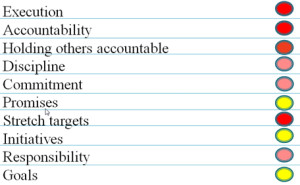The Problem:
All people break promises some of the time and most companies are bad at execution management, accountability, and getting predictable results.
The following are six barriers that are holding back your company. Putting in place an effective system for managing execution will allow your company to overcome these hurdles.
Six Hurdles to Effective Execution Management:
#1 People often don’t keep their promises
Keeping promises is the bedrock, heart and soul, glue, and foundation of successful and predictable execution.
- Do your leaders demand that people do what they promise or do they consistently tolerate excuses?
In companies where people keep their promises, goals are clear, expectations and priorities are well defined, and results are more predictable. Management time can therefore be spent creating value rather than babysitting.
#2 People are terrified of the idea of being held accountable.
People have all sorts of reasons for not wanting to be accountable.
- Is everyone in your company (not just the salespeople) accountable for specific results, and does your corporate culture support holding people accountable?
If you have to work at holding people accountable, it means they are not accountable. Reasons vary from not wanting to be pushed, avoiding the shame of failure, enjoying procrastination, and wanting a raise/bonus even if the results are poor. Unless someone has had a great experience being held accountable and thus see the benefit, most people will waver in their commitments and avoid accountability. In turn, many people are uncomfortable holding others accountable or simply don’t have the skills to do so without being a jerk. Effective execution management systems provide the structure for accountability as well as the mindset and behavior shift to empower accountability and results.
#3 People like to be comfortable
Corporate cultures typically include rigid structures to keep people comfortable and avoid crucial conversations.
- When a choice is required, does the executive team or company culture favor the past or the desired future? Are new ways of managing being created?
Growth and change are uncomfortable. Managing execution requires having conversations about missed expectations, unfulfilled promises, giving feedback, coaching, breakdowns, failures, and changes. A solid execution management system ensures that such conversations happen when they need to.
#4 Our relationship to the language of Managing Execution Must Change
Most people have a less-than-positive relationship with or don’t get excited when hearing words like discipline, commitment, performance, progress, promises, and goals.
- If you were to tell each employee individually, “I’d like to speak with you about your [fill in the blank: _____] (commitment, performance, progress, promises, or goals), would you expect them to be excited about the conversation? Would you be excited about the conversation?
Take a moment and imagine people in your company getting excited to speak with you about goals, results, commitment, promises, and performance. Imagine those conversations being inspiring opportunities to raise the bar and resolve problems happening with ease and flow. Imagine people doing what they promise and the results being outstanding. Different right?
#5 No system for Managing Execution
Executives believe their companies have a system for managing execution, but most do not.
- Does your company have a system in place for managing execution? If so, what is it called and where is it?
Performance reviews, team meetings, one-on-ones, project management, operational reviews, and bonus structures are all important, but the existence of these doesn’t mean your company has a comprehensive system in place to manage execution. For more on what execution management is, click here.
#3 Lack of courage, vision and commitment on the part of the senior executive
Whether or not a company has a system in place for managing execution and is great at using that system is a function of the CEO’s, President’s, or most senior executive’s willingness and commitment to make it a strategic initiative for the company.
- Is implementing and getting great at managing an execution management system an imperative this year, and is the most senior executive leading that charge?
Being great at getting results and transforming the corporate mindset about execution starts at the very top, with the implementation of an execution management system.
A comprehensive system for managing execution will create a new way of thinking about getting results and transform how people think about the crucial elements of managing for specific results.
Over the years I have seen that when senior executives are passionate and committed to implementing and managing successful execution management systems and leading the mindset and behavior shift that accompanies in. Those companies are simply better at managing execution and they get better and more predictable results.
To learn more about how to make getting predictable results and getting great at execution management a core competency for your company, send me a note, and let’s set up a video call.
Please post comments and tell me what you would like to hear more about to influence my future articles. And, spread the word by using the like and share buttons below.
 Matthew Levy is the Chief Catalyst of RESULTS MANAGEMENT GROUP, LLC, a growth management consulting and executive coaching firm that dramatically shifts business results by facilitating the creation of compelling visions and strategies, aligning executive and other management teams, developing an organizational capacity to manage execution and designing organizational environments that support the attainment of dramatically better results in any area.
Matthew Levy is the Chief Catalyst of RESULTS MANAGEMENT GROUP, LLC, a growth management consulting and executive coaching firm that dramatically shifts business results by facilitating the creation of compelling visions and strategies, aligning executive and other management teams, developing an organizational capacity to manage execution and designing organizational environments that support the attainment of dramatically better results in any area.






Nice article Matthew ( and Happy New Year). This is one of the highest leverage topics in management today. I support all of your major topic areas and just want to embellish them a bit from my perspective.
1. When I had the position of CQO , I banged the drum on the importance of Quality of Commitment. This is perhaps the most important aspect of quality to my mind and it drives all sorts of positive behaviors. Commitments to customers for delivery and performance when kept reinforce satisfaction and drive repeat business. New product commitments when met drive a stronger partnership with a carrier or retailer customer, and allow both sides to plan and maximize their results. Most important the quality of the company’s commitment to the associate and the associate’s commitments to the company is really what makes the world go round…..but this is the key topic of your note…
You mention the vision and articulation of importance of commitment by the senior leaders. It is not just important to bang the drum on meeting what you said you were doing to do, but also to articulate WHY this is important to the health of the company. The concepts of cost of slippage to a business, to the cost of penalties and accompanying concessions for delivery problems, and the ability to manage cash flow in that environment can be used to align the organization with the importance of commitment management. One way I used when managing the engineering team in the police radio business of Motorola is to name our weekly project reviews “Meet Our Commitments” meetings, still referred to in the parlance as MOC…. Everyone has a role, and the not so secret key to success is to align the roles and clarify the interactions in terms of real world results to customers and to the bottom line.
Thanks for your insights and keep them coming.
Coming from the Chief Quality Officer (CQO) of Motorola, that means a lot to me, Rey. Thank you.